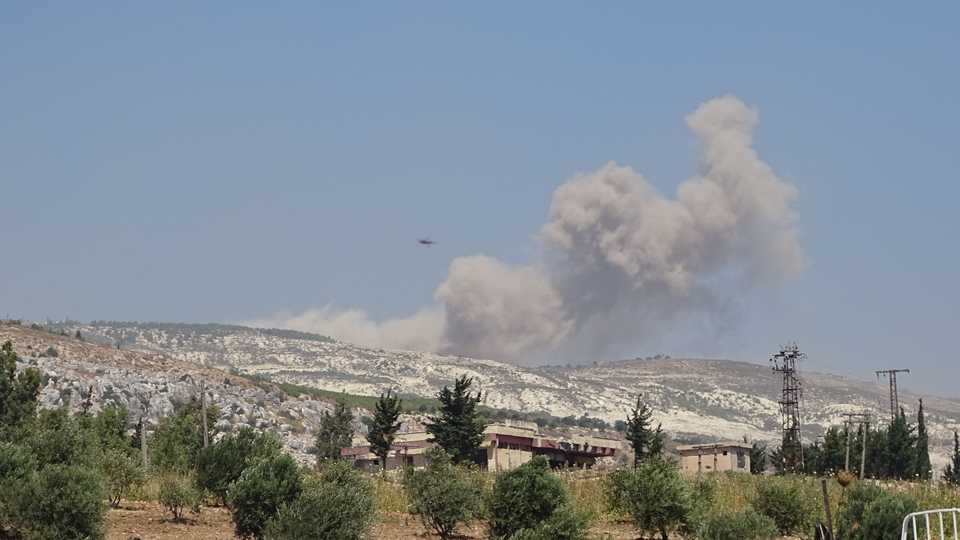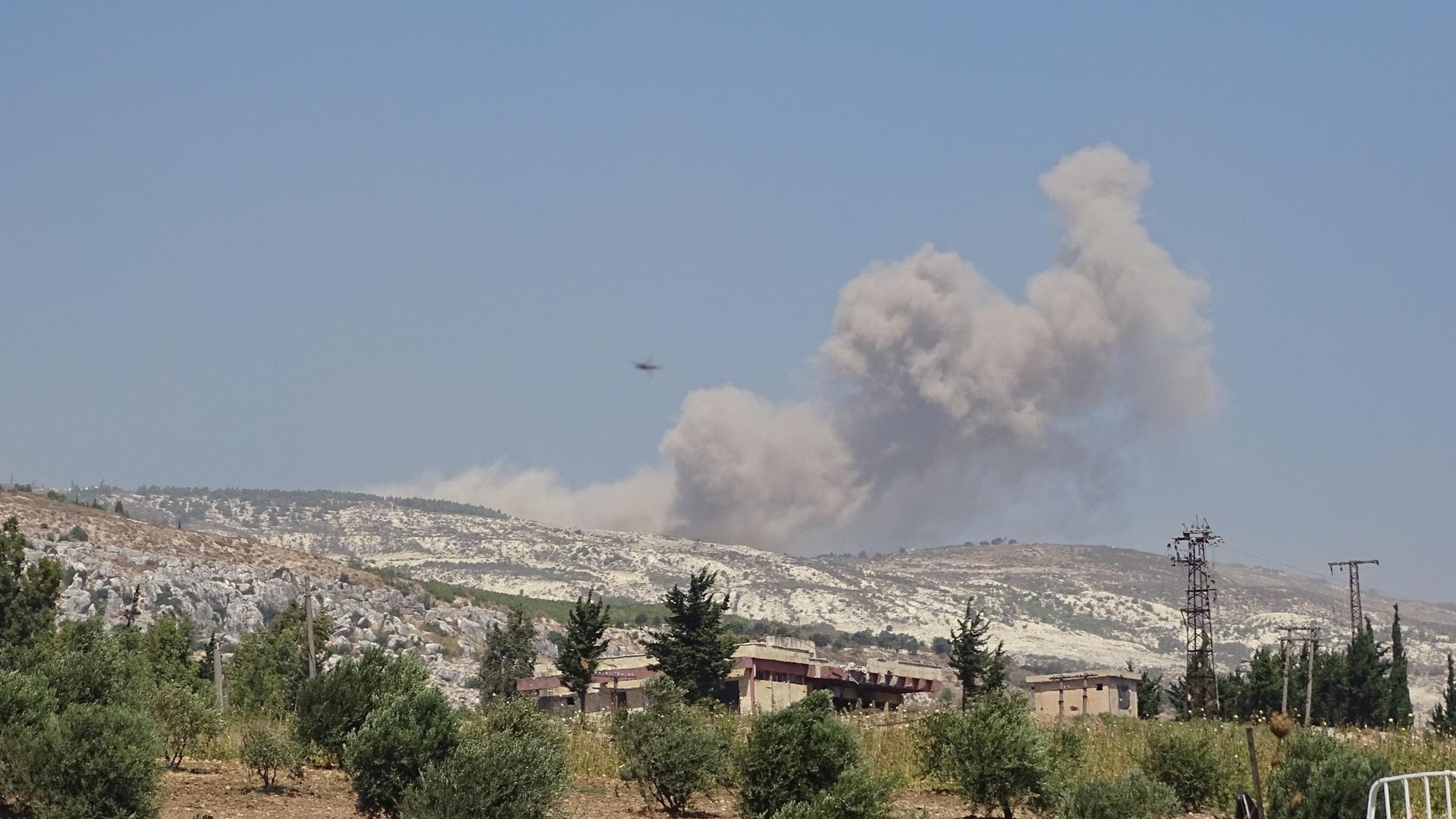
Russian and Syrian regime jets hammered a major opposition and rebel stronghold on Tuesday, a war monitor said, killing 13 civilians but no fighters. The Idlib offensive comes just days before leaders of Russia, Iran and Turkey meet in Tehran to discuss an expected Syrian regime offensive that could spark a humanitarian disaster.
The warplanes bombarded countryside, including residential areas, around Jisr al Shughour on the western edge of the opposition and rebel enclave of Idlib after weeks of lull, according to the Syrian Observatory for Human Rights and an opposition source.
According to local sources, Russian fighter jets also targeted residential areas in Basanqul, Ghani, Innab and Sirmaniyah districts. They have also reportedly conducted attacks in northern Hama’s Zayzun region.
Syrian opposition sources said that Russian military aircraft—flying out of the Hmeimim airbase—had carried out at least 20 separate attack sorties in recent days.
Mustafa Haj Yusuf, a civil-defence official in Idlib, said the Russian strikes had killed at least nine civilians—including five children— in Jisr al Shughour alone, while leaving at least 20 more people injured.
For regime leader Bashar al Assad, the defeat of rebels in the northwestern province would mean breaking the last major stronghold of active military opposition to his rule, though other large areas also remain beyond his control.
A military escalation in Idlib, which is home to over a million displaced Syrians who fled war in other parts of the country, is expected to bring forth a humanitarian disaster of unprecedented scale, the United Nations has warned.
TRT World’s Hasan Abdullah has more.
An attack on Idlib would be a massacre, Turkey’s President Recep Tayyip Erdogan was quoted as saying by Turkish news organisation Hurriyet Daily.
Tehran talks and phone diplomacy
Turkey’s Foreign Minister Mevlut Cavusoglu on Tuesday spoke with US Secretary of State Mike Pompeo via telephone, according to Turkish diplomatic sources.
The men discussed bilateral issues, Syria’s Idlib and Manbij, said the sources, who spoke on condition of anonymity due to restrictions on talking to the media.
Pompeo and Cavusoglu “agreed that any Assad regime military offensive in Idlib would be an unacceptable, reckless escalation of the conflict in Syria,” said US Department of State spokeswoman Heather Nauert.
Washington has warned Assad against using chemical weapons, promising a swift response if he did.
The UN’s special envoy for Syria called on the leaders of Russia and Turkey on Tuesday to dialogue to effect a solution for Syria’s Idlib, even before the Tehran talks scheduled for September 7.
“To President [Vladimir] Putin and President [Recep Tayyip] Erdogan, you are the ones, who actually were able to talk to each other, make a telephone call, organise a formula that allow the end of that horrible peril not to be the worst,” Staffan de Mistura said at a news conference at the UN Office in Geneva.
“[A] telephone call between two of you would make a big difference even before Tehran,” he added.
Mistura said talks between Russia and Turkey held the key to resolving the fate of Idlib without a bloodbath. He said he had heard reports that Damascus had set a September 10 deadline for diplomacy to work before attacking.
The upcoming summit in Tehran, which will be attended by Iran, Russia and Turkey, would yield positive results, Erdogan was quoted by the Turkish daily as saying.
The last opposition bastion?
Since Russia’s entry into the war on his side in 2015, Assad and his other allies, Iran and a group of regional Shia militias, have forced the rebels from a succession of bastions including Aleppo, Eastern Ghouta and Deraa, ground zero in Syria’s more than seven-year war.
A Syrian regime minister said the siege of Idlib would probably be resolved by force, reiterating what officials from the regime said earlier last week. “Until now, military action is more likely than reconciliations,” Reconciliation Minister Ali Haidar told Russia’s Sputnik news agency.
Damascus uses the term “reconciliation” for the negotiated rebel surrenders that have taken place in some areas.
“Idlib is different from other regions because of the large numbers of fighters,” Haidar said. “However we cannot say there is no gateway to reconciliation.”
Half of Idlib’s over 3.5 million people have already fled there from their homes in other parts of Syria, according to the United Nations, and any offensive threatens new displacement and human misery.
It could also spark a wider confrontation with Turkey, a supporter of the opposition, whose army has set up observation posts along the Idlib front lines to deter fighting.
Turkey’s Anadolu Agency reported that Turkish armed forces were reinforcing the Idlib border with tanks, and Reuters television filmed a convoy heading towards the border.
Threat of chemical weapon use
Tuesday’s air strikes came hours after US President Donald Trump warned Assad and his allies not to “recklessly attack” Idlib, saying that hundreds of thousands might die. The White House said in a statement that Trump was monitoring the situation in Idlib province, where it said millions of innocent civilians are under threat of an attack by Assad.
“Let us be clear, it remains our firm stance that if President Bashar al Assad chooses to again use chemical weapons, the United States and its Allies will respond swiftly and appropriately,” the statement read.
Trump has twice ordered US-led air strikes against targets in Syria in response to what Washington called the Assad’s use of chemical weapons against civilians.
The UN Security Council will discuss Idlib on Friday, Washington’s ambassador to the United Nations said.
“This is a tragic situation, and if they want to continue to go the route of taking over Syria, they can do that,” Nikki Haley said at a news conference, referring to the regime of Assad as well as its allies Russia and Iran.
“But they cannot do it with chemical weapons. They can’t do it assaulting their people and we’re not going to fall for it,” she added.
The world’s chemical weapons watchdog has documented systematic use of banned munitions in Syria’s civil war, including nerve agent sarin and sulfur mustard gas. But the body, the Organization for the Prohibition of Chemical Weapons, has not assigned blame for the attacks.
“If there are chemical weapons that are used, we know exactly who’s going to use them,” Haley said.
The Kremlin on Tuesday described Idlib, where militants dominate, as a “nest of terrorism”. Spokesman Dmitry Peskov added: “We know that Syria’s armed forces are preparing to resolve this problem.”
Iran echoed that theme. “Terrorist groups (in Idlib) have mixed with the people,” said Abbas Araqchi, deputy foreign minister, according to the Islamic Republic News Agency. “They are using people as human shields.”
Idlib’s dominant militant faction is Tahrir al Sham, an alliance spearheaded by al Qaeda’s former official affiliate in Syria, the al Nusra Front, though other groups are also present.
Last week Mistura while warning against military action in Idlib, said the Nusra Front and al Qaeda, both of which the international body designates as terrorists, had an estimated 10,000 fighters in Idlib.
Securing Turkey’s borders
Turkey fears a major assault on Idlib could send a new wave of refugees towards its border, and wants to maintain a “de-escalation agreement” that it struck with Russia and Iran last year.
It has held two major operations in Syria, creating a buffer zone along its border in an area north of Aleppo that adjoins Idlib, where it has set up a local administration alongside Syrian opposition and rebel groups.
Foreign Minister Mevlut Cavusoglu said Turkey was discussing joint action with Russia to target terrorist groups in Idlib while avoiding a full-scale offensive. Ankara last week added Tahrir al Sham to its list of designated terrorist groups.
Turkey urges differentiation of terrorists from others
Ankara has said the presence of militant groups in Idlib is being used a pretext for a military operation. When he was in Russia in late August, Cavusoglu said “we have to differentiate terrorists from other people,” but added that it was also important to eliminate Russia’s concerns.
Iran’s Foreign Minister Mohammad Javad Zarif, on a visit to Syria, told Iranian state television: “Our efforts are for … the exit of terrorists from Idlib to be carried out with the least human cost.”
He and Peskov said Idlib would be a major subject of discussion at a September 7 summit of Russia’s Vladimir Putin, Turkey’s Recep Tayyip Erdogan and Iran’s Hassan Rouhani.
Last week a source close to Damascus said the regime was preparing a phased assault that would initially target the areas in the south and west of the opposition and rebel enclave.
Even a staggered offensive would involve fighting around Turkish observation posts, potentially triggering a new escalation in an already complex war.










Discussion about this post